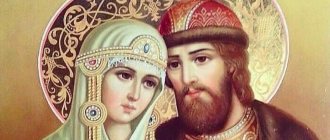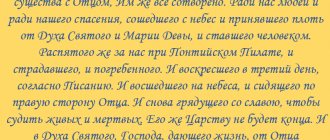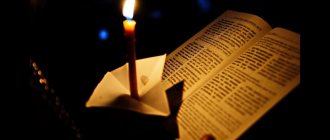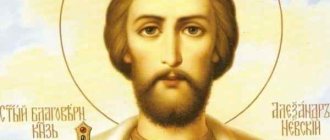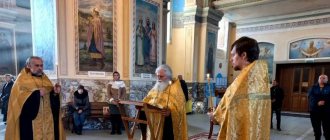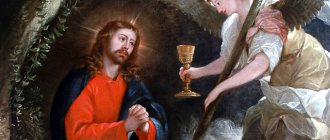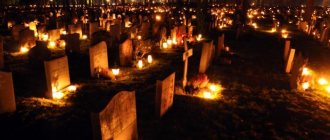The meaning and purpose of the troparion of Alexander Nevsky
The troparion and kontakion are read on the days of remembrance of the saint, only 5 times a year:
- On the third week after Pentecost, together with the Council of Novgorod Saints.
- May 23, the day of the Council of Rostov-Yaroslavl Saints.
- June 23, together with the Cathedral of Vladimir Saints.
- August 30 is the day of the transfer of the saint’s relics.
- December 6 – the day of death (1263).
In prayer chants in honor of the saint - troparions - the inhabitants of the Russian land praise him, speaking of his unsurpassed merits in preserving the Russian land and Russian statehood. At the same time, they ask not to abandon their patronage to the Motherland in the most difficult moments of its existence.
After all, the son of Yaroslav and the grandson of Vsevolod became a miracle worker during his lifetime, otherwise it is impossible to explain where so much strategic talent, military wisdom, diplomatic cunning and the ability to calculate his actions several steps ahead came from in a very young man, almost a youth. It was thanks to this gift that he was able to build relationships with the enemies of the Russian land not only from a position of strength, which he used on the western borders, but also from a position of cunning and diplomacy, which he used on the eastern outskirts of the Motherland.
It is these qualities that are sung in this short prayer, accompanied by a request to pray before the Lord for us today.
Prayer for the purchase of an apartment, house, housing to St. Spyridon
It is generally accepted that Orthodox believers turn to saints only in the worst and most difficult moments of life. But at the same time, there are prayers that change the real understanding of the usual and generally accepted rules. There are many situations when a person harbors bad intentions and thoughts. For example, this is when, when making a purchase and sale transaction, one of the parties is mercantile and tries to make “profit” from an incorrectly conducted transaction. In such cases, in order to avoid falling for an unscrupulous seller or buyer, it is customary to read a prayer for a successful purchase of a house to Saint Spyridon.
Why do they pray for the sale of property to Spiridon?
The prayer to buy a house for Spyridon of Trimifuntsky has special power. Since it is this saint who is considered the intercessor of all those Orthodox believers who experience certain material needs or who have problems with housing. In addition, this is one of the saints to whom Christians usually turn with prayer requests in such cases as:
- problems with buying or selling real estate;
- problems with material and financial issues.
We advise you to study: Should I pray before eating?
It should be noted that sometimes you need to urgently sell real estate, but throughout the entire search period certain circumstances arise that create an unfavorable atmosphere for concluding a profitable deal.
Such factors can be fear, crisis and much more. A prayer request to the saint will not only help you overcome fear, but will also help you find a good buyer or a conscientious seller.
How to read a prayer request correctly
As you know, in order for a prayer request to be effective, it must be pronounced correctly. Otherwise, the action may be reversed and the result completely opposite.
Therefore, it is very important to do everything correctly and in a timely manner. Since the saints do not tolerate the negative and bad intentions of the person praying
Full text in Russian
The Troparion is not the only prayer in honor of the saint. It is followed by a kontakion - a longer prayer containing an extended history of the saint’s exploits and his life. And at the end, a majesty is read, which is intended to complete the story and fully reveal the love of those praying and their recognition of the merits of their patron and protector - Prince Alexander Nevsky.
Troparion
The troparion is read at the end of the liturgy or vespers and contains a brief description of his Divine exploit and a request for protection and patronage:
“Recognize your brothers, Russian Joseph, not in Egypt, but reigning in Heaven, the blessed prince Alexander, and accept their prayers, multiplying the number of fruits for people by the fruitfulness of your land, protecting the cities under your rule with prayer, providing assistance to Orthodox Christians in the fight against enemies.” .
Kontakion
During the singing of the kontakion, all the greatness of the saint, his strength and his closeness to the Lord are revealed:
“We honor you like a bright star, shining in the east and coming to the west, for you enrich this entire country with miracles and beauty, and enlighten with faith those who honor your memory, blessed Alexander. Therefore, today we celebrate your dormition, your people, pray to save your Fatherland and all those who come to the shrine with your relics, and who call to you with faith: “Rejoice, strength of our city.”
Yokos z7
It’s wonderful to see how an invincible warrior will humbly bow his head2 before the infidels, and then go after his people for the sake of the people: it’s wonderful to remember your invincible humility , my dear Alexandra, and 4 and 3 GDevi favored є3si2, and 3 people saved their‰ є3si2 : Even more grateful we cry ty2:
Rejoice, to the imitator of the city of humility: rejoice, to the teacher due respect for the given authorities.
Rejoice, contrary to all exaltations: Rejoice, ascetic and true obedient.
Rejoice, to all of us in the image of our faithful servants: Rejoice, to the leading mentor in the blessed people of the future.
Rejoice, those who are subordinate to the leader in God's commanded obedience to those in power: Rejoice, ћkw many times for the good of his people, he traveled є3с2 to the homeless, in no way at all and 3spyt†niz.
Please, you are not afraid of 3si2, having called bGa, come to batyev, and fulfill the command: Please, you have taken on many people the terrible answer of the unreasonable their people have risen.
Rejoice, ћkw њgradi1l є3с2 people of yours‰ t are harmful with the wrong public: rejoice, ћкw wise њgradi1l є3с2 in the land2 of its own technological brilliance and3 pre†ніz .
Welcome, your blessed great prince Alexandra.
Life
Brief life of the blessed prince Alexander (in schema Alexy) Nevsky
The Holy Blessed Grand Duke Alexander Nevsky was born on May 13, 1221 in the city of Pereyaslavl-Zalessky. His father, Yaroslav, in Baptism Theodore, was the youngest son of Vsevolod III the Big Nest. Mother of St. Alexandra, Feodosia Igorevna, was the daughter of Mstislav Udaly (Udatny). In 1227, Prince Yaroslav, at the request of the Novgorodians, began to reign in Novgorod the Great. He took his sons, Fyodor and Alexander, with him.
The most difficult time in the history of Rus' began: Mongol hordes were coming from the east, hordes of knights were approaching from the west. At this terrible hour, God’s Providence raised up the holy Prince Alexander, a great prayer warrior, ascetic and builder of the Russian land, for the salvation of Rus'.
Taking advantage of Batu's invasion, hordes of crusaders invaded the borders of the Fatherland. The Swedes were the first. Many ships approached the Neva under the command of Earl Birger. St. Alexander, who was not yet 20 years old at the time, prayed for a long time in the Church of Hagia Sophia. Archbishop Spyridon blessed St. the prince and his army to battle. Coming out of the temple, Alexander strengthened his squad with words filled with faith: “God is not in power, but in truth. Some with weapons, others on horses, but we will call on the name of the Lord our God!” With a small retinue, the prince hurried towards the enemies. But there was a wonderful omen: a warrior standing on sea patrol saw at dawn on July 15 a boat sailing on the sea, and on it St. martyrs Boris and Gleb in scarlet robes. Alexander, encouraged, courageously led his army against the Swedes with prayer. “And there was a great slaughter with the Latins, and he killed countless numbers of them, and he put a seal on the leader’s face with a sharp spear.” For this victory on the Neva River, won on July 15, 1240, the people called St. Alexandra Nevsky.
The German knights remained a dangerous enemy. In 1241, with a lightning march of St. Alexander returned the ancient Russian fortress of Koporye, expelling the knights. In winter 1242, he liberated Pskov, and on April 5 he gave the Teutonic Order a decisive battle on the ice of Lake Peipsi. The Crusaders were completely defeated. Name of St. Alexandra became famous throughout Holy Rus'.
The western borders of the Russian land were securely fenced, the time had come to secure Rus' from the east. In 1242 St. Alexander Nevsky and his father Yaroslav went to the Horde. The Lord crowned the sacred mission of the defenders of the Russian land with success, but it took years of work and sacrifice. Prince Yaroslav gave his life for this. The alliance bequeathed by the father with the Golden Horde - then necessary to prevent a new defeat of Rus' - continued to strengthen the St. Alexander Nevskiy. Promising his support, St. Alexander gave Batu the opportunity to go on a campaign against Mongolia and become the main force in the entire Great Steppe. In 1252, many Russian cities rebelled against the Tatar yoke. Once again a threat arose to the very existence of Rus'. St. Alexander again had to go to the Horde to ward off the punitive invasion of the Tatars from the Russian lands. St. Alexander became the sole Grand Duke of all Rus'. In 1253 he repelled a new raid on Pskov, in 1254 he concluded an agreement on peaceful borders with Norway, and in 1256 he went on a campaign to Finnish land. In the darkness of paganism, St. Alexander carried the light of evangelical preaching and Orthodox culture. All of Pomerania was enlightened and mastered by the Russians.
In 1256 Khan Batu died. The Holy Prince went to Sarai for the third time to confirm the peaceful relations of Rus' and the Horde with the new Khan Berke. In 1261, through the efforts of St. Alexander and Metropolitan Kirill was established in Sarai, the capital of the Golden Horde, a diocese of the Russian Orthodox Church.
The era of the great Christianization of the pagan East had come, and this was prophetically predicted by St. Alexander Nevsky's historical vocation of Rus'. In 1262, on his instructions, Tatar tribute collectors and warrior recruiters - Baskaks - were killed in many cities. They were waiting for Tatar revenge. But the great defender of the people again went to the Horde and wisely directed events in a completely different direction: citing the Russian uprising, Khan Berke stopped sending tribute to Mongolia and proclaimed the Golden Horde an independent state, thereby making it a barrier to Rus' from the east. In this great union of Russian and Tatar lands and peoples, the future multinational Russian state matured and strengthened, which later included within the Russian Church almost the entire heritage of Genghis Khan to the shores of the Pacific Ocean.
This diplomatic trip of St. Alexandra Nevsky in Sarai was the fourth and last. On the way back, before reaching Vladimir, in Gorodets, in the monastery, the prince-ascetic gave up his spirit to the Lord on November 14, 1263, completing the difficult journey of life by accepting the holy monastic schema with the name Alexy. His holy body was carried to Vladimir, the journey lasted nine days, and the body remained incorrupt. On November 23, during his burial in the cathedral church of the Nativity Monastery in the city of Vladimir (now a monument to the holy prince is erected there; another monument was erected in the city of Pereyaslavl-Zalessky), God revealed “a miracle wonderful and worthy of memory”: the saint himself extended his hand for a prayer of permission. The veneration of the noble prince began immediately after his burial. Grand Duke John Ioannovich (1353–1359), in his spiritual will, written in 1356, left his son Demetrius (1363–1389), the future winner of the Battle of Kulikovo, “the icon of Saint Alexander.” The incorrupt relics of the blessed prince were discovered, according to a vision, before the Battle of Kulikovo - in 1380, and then a local celebration was established. Church-wide glorification of St. Alexander Nevsky took place under Metropolitan Macarius at the Moscow Council in 1547. Russian commanders resorted to the prayers of the holy prince, who became famous for the defense of the Fatherland, in all subsequent times. On August 30, 1721, Peter I, after a long and exhausting war with the Swedes, concluded the Peace of Nystad. It was decided to consecrate this day by transferring the relics of the blessed prince Alexander Nevsky from Vladimir to the new, northern capital, Petersburg, located on the banks of the Neva. Taken from Vladimir on August 11, 1723, the holy relics were brought to Shlisselburg on September 20 of the same year and remained there until 1724, when on August 30 they were installed in the Trinity Cathedral of the Alexander Nevsky Lavra, where they rest today. By decree of September 2, 1724, the celebration was established on August 30 (in 1727, the celebration was canceled due not to its ecclesiastical nature, but due to the struggle of factions at the royal court. In 1730, the celebration was restored again).
Archimandrite Gabriel Buzhinsky (later Bishop of Ryazan, † April 27, 1731) compiled a special service to commemorate the Peace of Nystad, combining it with the service to St. Alexander Nevsky.
The name of the defender of Russia's borders and patron of warriors is known far beyond the borders of our Motherland. Evidence of this is the numerous churches dedicated to St. Alexander Nevsky. The most famous of them: the Patriarchal Cathedral in Sofia, the Cathedral in Tallinn, the temple in Tbilisi. These churches are the guarantee of friendship between the Russian people-liberator and fraternal peoples.
The complete life of the blessed prince Alexander (in schema Alexy) Nevsky
The composition of “The Life of Alexander Nevsky” dates back to the 80s. XIII century and are associated with the names of Dmitry Alexandrovich, son of Alexander Nevsky, and Metropolitan Kirill, with the Monastery of the Nativity of the Virgin Mary in Vladimir, where the prince’s body was buried. Here in the 13th century. The veneration of the prince as a saint begins and the first edition of his life appears.
In the name of our Lord Jesus Christ, the Son of God.
I, thin and sinful, narrow-minded, dare to describe the life of the holy Prince Alexander, son of Yaroslav, grandson of Vsevolodov. Since I heard from my fathers and myself witnessed his mature age, I was glad to tell about his holy, honest, and glorious life. But as the Tributary said: “Wisdom will not enter an evil soul: for it dwells in elevated places, stands in the middle of roads, and stops at the gates of noble people.” Although I am simple in mind, I will still begin, with the prayer of the Holy Mother of God and the help of Holy Prince Alexander.
This prince Alexander was born from a merciful and philanthropic father, and most of all a meek one, the great prince Yaroslav and from his mother Theodosia. As Isaiah the prophet said: “Thus says the Lord: “I appoint princes; for they are sacred, and I lead them.” And truly, his reign was not without God’s command.
And he was handsome like no one else, and his voice was like a trumpet among the people, his face was like the face of Joseph, whom the Egyptian king made the second king in Egypt, and his strength was part of the strength of Samson, and God gave him the wisdom of Solomon, His courage is like that of the Roman king Vespasian, who conquered the entire land of Judea. One day he prepared to besiege the city of Joatapata, and the townspeople came out and defeated his army. And only Vespasian remained, and turned those who opposed him to the city, to the city gates, and laughed at his squad, and reproached them, saying: “They left me alone.” Likewise, Prince Alexander won, but was invincible.
That is why one of the eminent men of the Western country, from those who call themselves servants of God, came, wanting to see the maturity of his strength, just as in ancient times the Queen of Sheba came to Solomon, wanting to listen to his wise speeches. So this one, named Andreas, having seen Prince Alexander, returned to his people and said: “I went through countries and peoples and did not see such a king among kings, nor a prince among princes.”
Hearing about such valor of Prince Alexander, the king of the Roman country from the Midnight Land thought to himself: “I will go and conquer the land of Alexander.” And he gathered great strength, and filled many ships with his regiments, and moved with great strength, puffing with the military spirit. And he came to the Neva, intoxicated with madness, and sent his ambassadors, proud, to Novgorod to Prince Alexander, saying: “If you can, defend yourself, for I am already here and ruining your land.”
Alexander, having heard such words, burned in his heart and entered the Church of Hagia Sophia, and, falling on his knees before the altar, began to pray with tears: “Glorious God, righteous, great God, mighty, eternal God, who created heaven and earth and set the boundaries You commanded the peoples to live without transgressing other people’s borders.” And, remembering the words of the prophet, he said: “Judge, O Lord, those who offend me and protect them from those who fight me, take a weapon and a shield and stand up to help me.”
And, having finished the prayer, he stood up and bowed to the archbishop. The archbishop was then Spyridon, he blessed him and released him. The prince, leaving the church, wiped away his tears and said to encourage his squad: “God is not in power, but in truth. Let us remember the Songmaker, who said: “Some with weapons, and others on horses, but we call on the name of the Lord our God; They were defeated and fell, but we survived and are standing upright.” Having said this, he went against the enemies with a small squad, not waiting for his large army, but trusting in the Holy Trinity.
It was sad to hear that his father, the great prince Yaroslav, did not know about the invasion of his son, dear Alexander, and he had no time to send news to his father, for the enemies were already approaching. Therefore, many Novgorodians did not have time to join, as the prince hurried to speak. And he came out against the enemy on Sunday, July fifteenth, having great faith in the holy martyrs Boris and Gleb.
And there was one man, the elder of the Izhora land, named Pelugiy, who was entrusted with night watch at sea. He was baptized and lived among his people, who were pagans, and his name was given in holy baptism Philip, and he lived pleasing to God, observing fasting on Wednesday and Friday, which is why God deigned him to see a wonderful vision on that day. Let's tell you briefly.
Having learned about the strength of the enemy, he went out to meet Prince Alexander to tell him about their camps. He stood on the seashore, watching both routes, and spent the whole night without sleep. When the sun began to rise, he heard a strong noise on the sea and saw one boat floating on the sea, and standing in the middle of the boat were the holy martyrs Boris and Gleb in red robes, holding their hands on each other’s shoulders. The rowers sat as if covered in darkness. Boris said: “Brother Gleb, tell us to row, and let us help our relative Prince Alexander.” Seeing such a vision and hearing these words of the martyrs, Pelugius stood, terrified, until the attack disappeared from his eyes.
Soon after this, Alexander came, and Pelugius, joyfully meeting Prince Alexander, told him alone about the vision. The prince told him: “Don’t tell this to anyone.”
After that, Alexander hastened to attack the enemies at six o'clock in the afternoon, and there was a great slaughter with the Romans, and the prince killed countless numbers of them, and on the face of the king himself he left the mark of his sharp spear.
Six brave men, like him, from Alexander’s regiment showed themselves here.
The first one is named Gavrilo Oleksic. He attacked the auger and, seeing the prince being dragged by the arms, rode all the way to the ship along the gangplank along which he and the prince were running; those pursued by him grabbed Gavrila Oleksich and threw him off the gangplank along with his horse. But by God's mercy he emerged from the water unharmed, and again attacked them, and fought with the commander himself in the midst of their army.
The second one is named Sbyslav Yakunovich, a Novgorodian. This one attacked their army many times and fought with one ax, having no fear in his soul; and many fell by his hand, and they marveled at his strength and courage.
The third - Yakov, a native of Polotsk, was a hunter for the prince. This one attacked the regiment with a sword, and the prince praised him.
The fourth is a Novgorodian named Mesha. This man on foot and his retinue attacked the ships and sank three ships.
The fifth is from the younger squad, named Sava. This one burst into the large royal golden-domed tent and cut down the tent pole. The Alexandrov regiments, seeing the fall of the tent, rejoiced.
The sixth is from Alexander’s servants, named Ratmir. This one fought on foot, and many enemies surrounded him. He fell from many wounds and died that way.
I heard all this from my master, Grand Duke Alexander, and from those who participated in this battle at that time.
There was a wondrous miracle at that time, as in the days of old under Hezekiah the king. When Sennacherib, the king of Assyria, came to Jerusalem, wanting to conquer the holy city of Jerusalem, an angel of the Lord suddenly appeared and killed one hundred and eighty-five thousand of the Assyrian army, and when morning came, they found only dead corpses. This was the case after Alexandrov’s victory: when he defeated the king, on the opposite side of the Izhora River, where Alexandrov’s regiments could not pass, a countless number of those killed by the angel of the Lord were found here. Those who remained fled, and the corpses of their dead soldiers were thrown into ships and sank them into the sea. Prince Alexander returned in victory, praising and glorifying the name of his Creator.
In the second year after Prince Alexander returned with victory, they again came from the Western Country and built a city on the land of Alexandrova. Prince Alexander soon went and destroyed their city to the ground, and hanged them, some, took others with him, and, having pardoned others, released them, for he was immeasurably merciful.
After Alexandrova’s victory, when he defeated the king, in the third year, in winter, he went with great strength to German land, so that they would not boast, saying: “Let us subdue the Slovenian people.”
And they had already taken the city of Pskov and imprisoned the German governors. He soon expelled them from Pskov and killed the Germans, and tied up others and liberated the city from the godless Germans, and ravaged and burned their land and took countless prisoners, and killed others. The proud Germans gathered and said: “Let's go and defeat Alexander and capture him.”
When the Germans approached, the guards found out about them. Prince Alexander prepared for battle, and they went against each other, and Lake Peipus was covered with many of these and other warriors. Alexander's father Yaroslav sent his younger brother Andrei with a large retinue to help him. And Prince Alexander also had many brave warriors, like King David in ancient times, strong and strong. So Alexander’s men were filled with the spirit of war, because their hearts were like the hearts of lions, and they exclaimed: “O our glorious prince! Now the time has come for us to lay down our heads for you.” Prince Alexander raised his hands to the sky and said: “Judge me, God, judge my quarrel with the unrighteous people and help me, Lord, as in ancient times he helped Moses overcome Amalek and our great-grandfather Yaroslav the accursed Svyatopolk.”
It was then Saturday, and when the sun rose, the opponents met. And there was a cruel slaughter, and there was a crash from breaking spears and a ringing from the blows of swords, and it seemed that a frozen lake was moving, and no ice was visible, for it was covered with blood.
And I heard this from an eyewitness who told me that he saw the army of God in the air, coming to the aid of Alexander. And so he defeated the enemies with the help of God, and they fled, but Alexander cut them down, driving them as if through the air, and they had nowhere to hide. Here God glorified Alexander before all the regiments, like Joshua at Jericho. And the one who said: “Let’s capture Alexander,” God gave into Alexander’s hands. And there has never been an opponent worthy of him in battle. And Prince Alexander returned with a glorious victory, and there were many captives in his army, and they led barefoot next to the horses of those who call themselves “God’s knights.”
And when the prince approached the city of Pskov, the abbots, and priests, and all the people met him in front of the city with crosses, giving praise to God and glorifying the lord Prince Alexander, singing the song: “You, Lord, helped the meek David to defeat the foreigners and our faithful prince with the arms of the godfather, liberate the city of Pskov from foreigners by the hand of Alexandra.”
And Alexander said: “O ignorant Pskovites! If you forget this before the great-grandsons of Alexander, then you will become like the Jews, whom the Lord fed in the desert with manna from heaven and baked quails, but they forgot all this and their God, who delivered them from captivity in Egypt.”
And his name became famous in all countries, from the Khonuzh Sea and to the Ararat Mountains, and on the other side of the Varangian Sea and to the great Rome.
At the same time, the Lithuanian people gained strength and began to plunder the Alexandrov possessions. He went out and beat them. One day he happened to ride out against his enemies, and he defeated seven regiments in one ride and killed many of their princes, and took others prisoner, while his servants, mocking, tied them to the tails of their horses. And from that time on they began to fear his name.
At the same time, there was a strong king in the Eastern country, to whom God subjugated many nations, from the east to the west. That king, having heard about such glory and courage of Alexander, sent envoys to him and said: “Alexander, do you know that God has conquered many nations to me? So, are you the only one who doesn’t want to submit to me? But if you want to save your land, then come to me quickly and you will see the glory of my kingdom.”
After the death of his father, Prince Alexander came to Vladimir in great strength. And his arrival was menacing, and news of him rushed to the mouth of the Volga. And the Moabite wives began to frighten their children, saying: “Alexander is coming!”
Prince Alexander decided to go to the Tsar in the Horde, and Bishop Kirill blessed him. And King Batu saw him and was amazed, and said to his nobles: “They told me the truth, that there is no prince like him.” Having honored him with dignity, he released Alexander.
After this, Tsar Batu became angry with his younger brother Andrei and sent his governor Nevryuy to destroy the land of Suzdal. After the devastation of the Suzdal land by Nevruy, the great Prince Alexander erected churches, rebuilt cities, and gathered dispersed people into their homes. Isaiah the prophet said about such people: “A good prince in countries is quiet, friendly, meek, humble - and thus he is like God.” Without being seduced by wealth, without forgetting the blood of the righteous, he judges orphans and widows with justice, is merciful, kind to his household and hospitable to those who come from foreign countries. God helps such people, for God does not love angels, but in His generosity He generously gifts people and shows His mercy in the world.
God filled the land of Alexander with wealth and glory and God extended his years.
One day, ambassadors from the Pope from great Rome came to him with these words: “Our Pope says this: “We heard that you are a worthy and glorious prince and your land is great. That’s why they sent you two of the smartest of the twelve cardinals—Agaldad and Remont—so that you could listen to their speeches about the law of God.”
Prince Alexander, having thought with his sages, wrote him the following answer: “From Adam to the flood, from the flood to the division of nations, from the confusion of nations to the beginning of Abraham, from Abraham to the passage of the Israelites through the sea, from the exodus of the children of Israel to the death of King David , from the beginning of the reign of Solomon to Augustus and to the Nativity of Christ, from the Nativity of Christ to His Crucifixion and Resurrection, from His Resurrection and Ascension into Heaven to the reign of Konstantinov, from the beginning of the reign of Konstantinov to the first Council and the seventh - we know all this well , but we will not accept teachings from you.” They returned home.
And the days of his life multiplied in great glory, for he loved priests, and monks, and beggars, and he revered and listened to metropolitans and bishops as to Christ himself.
In those days there was great violence from non-believers; they persecuted Christians, forcing them to fight on their side. The great prince Alexander went to the king to pray for his people from this misfortune.
And he sent his son Dmitry to the Western countries, and sent all his regiments with him, and his close household members, saying to them: “Serve my son, as you serve me, with all your life.” And Prince Dmitry went in great strength, and conquered the German land, and took the city of Yuryev, and returned to Novgorod with many prisoners and with great booty.
His father, Grand Duke Alexander, returned from the Horde from the Tsar, and reached Nizhny Novgorod, and fell ill there, and, arriving in Gorodets, fell ill. Oh woe to you, poor man! How can you describe the death of your master! How will your eyes not fall out along with your tears! How can your heart not be torn out by the roots! For a man can leave his father, but he cannot leave a good master; If it were possible, I would go to the grave with him!
Having worked hard for God, he left the earthly kingdom and became a monk, for he had an immeasurable desire to take on the angelic image. God vouchsafed him to greater rank - schema. And so in peace he gave up his spirit to God in the month of November on the fourteenth day, in memory of the holy Apostle Philip.
Metropolitan Kirill said: “My children, know that the sun of the land of Suzdal has already set!” Priests and deacons, monks, poor and rich, and all the people exclaimed: “We are already perishing!”
The holy body of Alexander was carried to the city of Vladimir. The Metropolitan, the princes and boyars and all the people, small and large, met him in Bogolyubovo with candles and censers. People crowded, trying to touch his holy body on his honest bed. There was a cry, a groan, and a cry like never before, even the earth shook. His body was laid in the Church of the Nativity of the Holy Mother of God, in the great archimandrite, on the 24th day of November, in memory of the holy father Amphilochius.
There was a marvelous miracle then, worthy of memory. When his holy body was laid in the tomb, then Sebastian the Economist and Cyril the Metropolitan wanted to unclench his hand in order to insert a spiritual letter. He, as if alive, stretched out his hand and took the letter from the hand of the metropolitan. And confusion seized them, and they retreated slightly from his tomb. Metropolitan and Housekeeper Sevastian announced this to everyone. Who wouldn’t be surprised by that miracle, because his soul left his body and he was brought from distant lands in winter!


